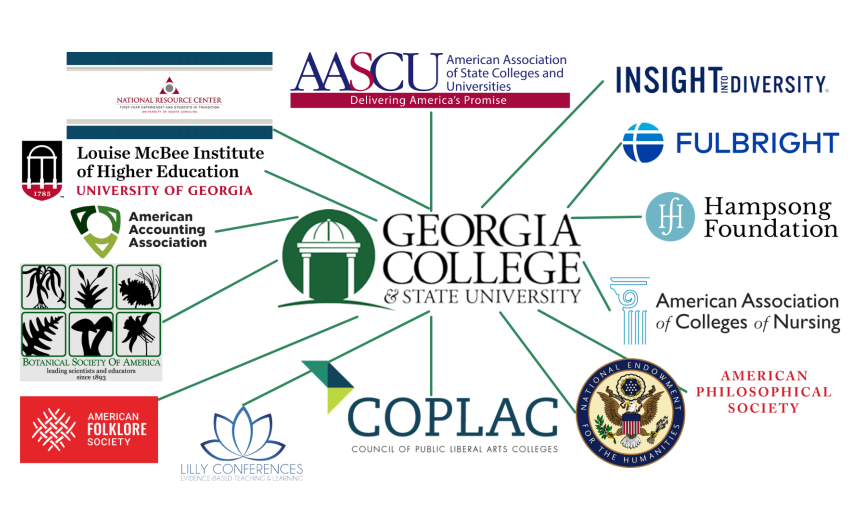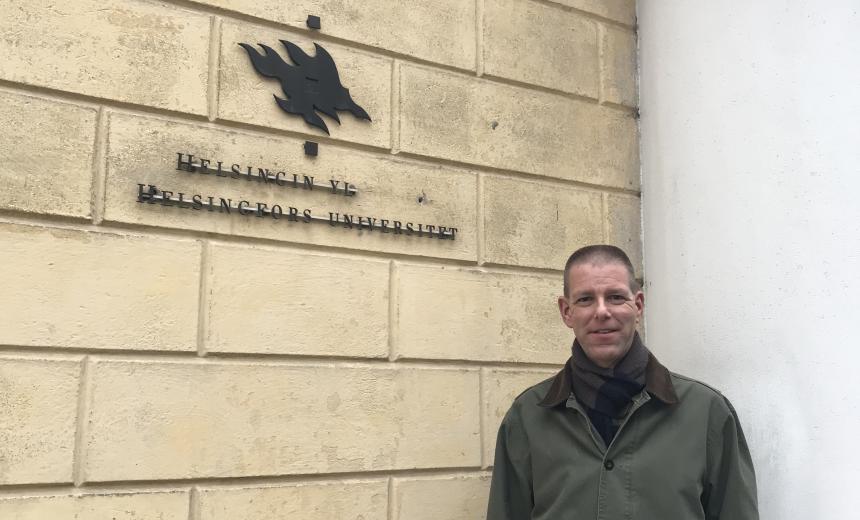
Awards sought by Georgia College Faculty and Staff, 2023-24
Georgia College strives to create a faculty-focused culture in which faculty are encouraged, supported, rewarded, and recognized in their efforts to seek out, apply for, and receive prestigious, faculty teaching awards and other opportunities. Faculty can search for awards on the GC Awards Database, and seek advice and assistance from those associated with this campus-wide initiative.
About the GC Awards Database...
This GC Awards Database is a resource for Georgia College faculty and staff. While comprehensive, it focuses on awards related to the disciplines practiced at Georgia College. The emphasis on SoTL and teaching awards reflects our core mission. Dissertation grants, travel awards, subventions, awards attached to academic conference presentations, awards with closed nomination processes, and institutional grants are not included. If there are awards within the scope of this database that are not yet included, you can make a recommendation to us here.
Access the database: GC Awards Database
Interested in learning more about award opportunities? Please feel free to reach out to us:
Dana Gorzelany-Mostak, Faculty Success Coordinator, dana.gorzelany@gcsu.edu
Awards Spotlight
Scott E. Buchanan, Ph.D.
Chair, Department of Government & Sociology
Award: Fulbright, American Studies, University of Helsinki

Why did you decide to pursue this professional award/opportunity?
I was inspired to pursue a Fulbright when a colleague of mine at The Citadel received one in 2012. To that point, I had always felt that Fulbrights were more the province of scholars who focused on international relations, foreign affairs, etc. After my colleague won his award, I realized how wrong I had been. Due to the active encouragement of others, I began to look for opportunities to apply.
What did you find surprising and/or challenging about the application process?
The applications process was relatively straightforward to me. Indeed, it was incredibly streamlined to me for such a prestigious award. Of course, it helped that my former colleague was so open in sharing his application with me to serve as a guide for what was expected. Now that I am a Fulbright alumnus, I have sat on two selection committees for applications. My advice is to be concise and candid in one’s application.
The larger challenge for me was navigating the process of obtaining a Finnish residence permit. It did not help matters that the Finnish government changed the procedure the year that I applied for a permit. In the end, all worked out, but it was a daunting process.
What campus resources did you draw upon in completing the application?
Since I was a faculty member at The Citadel at the time, I obviously did not utilize any Georgia College resources. However, the Fulbright is a commitment and investment on behalf of one’s college. In my case, The Citadel granted me a leave of absence to accept the Fulbright. Once I began talking to other Fulbright colleagues, I realized that many colleges require much more planning in terms of applying for a leave of absence, etc. In some cases, colleagues had applied for leaves of absence 2-3 years prior to their Fulbright semester/year.
In what ways did the award/experience enhance your professional/academic development? Were there some unexpected benefits?
Living abroad for an extended amount of time forces you to grow as a scholar, as you are challenged by new perspectives and approaches to seeking knowledge. More fundamentally, I found that the experience changed me as a human being, as it forced me to live in a very different culture and helped me to have a deeper understanding of how others see the world around them. In one sense, I suppose the old adage, “to walk around in someone else’s shoes,” applies here. It was also very interesting to see what esteem in which the Finns hold educators, at all levels. While they love sports, most especially ice hockey, Finnish society for the most part holds up educators as more important. That was a nice change of pace.
The biggest unexpected benefit was that I was surprised at how much I learned about the United States from nearly 5,000 miles away. Immersing yourself in another culture has a way of making you have a new perspective on your home country. Frankly, I was not expecting that to be the case, but it is one that I welcomed and continue to cherish.
What should other Georgia College faculty know about the application process for this award?
The good thing about the Fulbright process is that it forces one to think early and plan for a good application. My biggest advice is to be one’s self. Don’t be afraid to admit shortcomings if asked.
Previous Award Winners
GC Journeys Wins AASCU’S 2023 Excellence & Innovation Award
Inclusive programming earns College of Business and Technology national recognition
Marketing professor wins 2023 Felton Jenkins Jr. Hall Of Fame Faculty Award
Chemistry Professor wins 2023 COPLAC Award for impactful teaching
Two GCSU faculty named as Governor’s Teaching Summer Fellows
Dr. Mary Magoulick receives honorable mention for the Elli Köngäs-Maranda Prize
Dr. Brooke Conaway earns Felton Jenkins Jr. Hall of Fame Faculty Award
English professor receives grant to ‘transform’ Shakespeare for high school
Nicholson selected to conduct research in London, UK
Education faculty member receives national COPLAC award
Georgia College receives national award for focus on undergraduate research
Georgia College awarded $650,000 national science grant for low income students
GC Journeys wins Regents’ Momentum Year Award for excellence